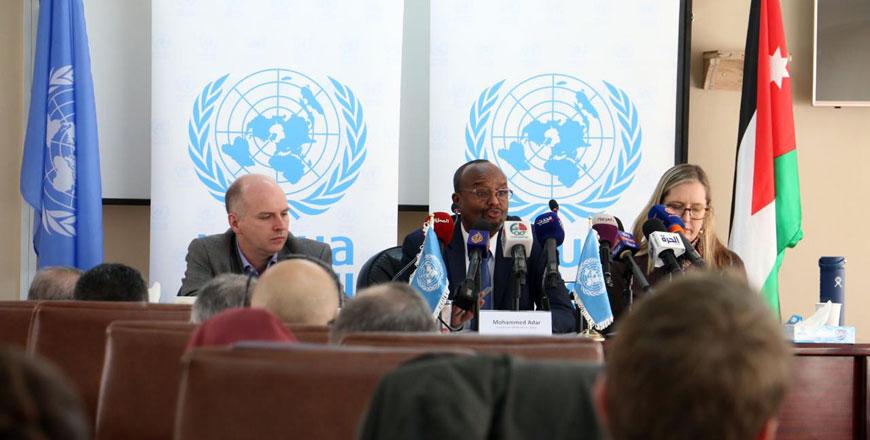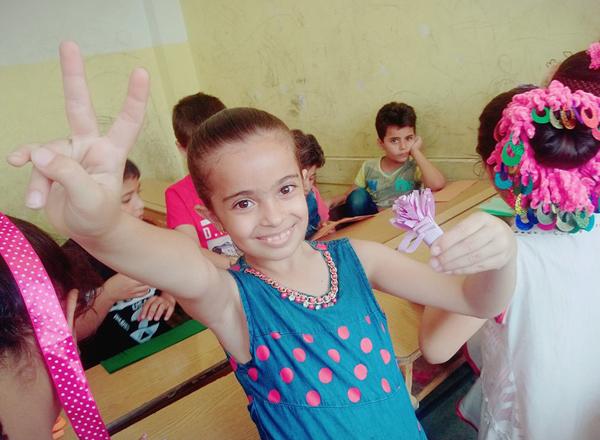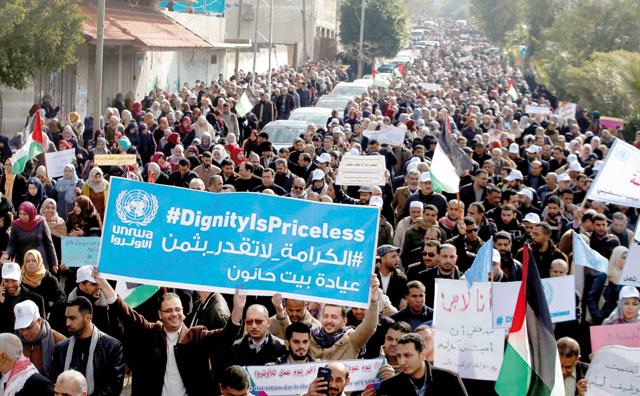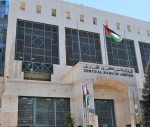You are here
As 2020 ushers in ‘daunting’ challenges, UNRWA calls for $149m in funding for Jordan operations
By Maram Kayed - Feb 03,2020 - Last updated at Feb 03,2020

UNRWA Jordan Director Mohammed Adar speaks during a press conference held at UNRWA’s headquarters in Amman on Monday (Photo courtesy of UNRWA)
AMMAN — A minimum of $149 million is needed to fund UNRWA’s 2020 essential services and assistance in Jordan for 2.3 million registered Palestinian refugees and 17,000 Palestinian refugees who recently migrated from Syria.
In a press conference held at UNRWA’s headquarters in Amman on Monday, UNRWA Jordan Director Mohammed Adar said the agency has suffered from “the most serious financial shortfall in its history”, as well as “a crisis of confidence in the agency’s senior leadership”.
However, “despite the challenging political environment and difficult socioeconomic conditions, the generous support of the host country, Jordan, and that of donors and partners has allowed us to continue providing essential services to Palestinian refugees,” Adar said.
“I would like to put on record our profound appreciation and gratitude for the unwavering support that the Government of Jordan affords to Palestinian refugees and to UNRWA,” he added.
In December, the UN General Assembly renewed UNRWA’s mandate for three years, extending it until June 30, 2023.
In 2019, UNRWA Jordan provided education services to over 118,000 students attending 169 UNRWA schools distributed around the Kingdom.
The agency also offered 47 courses to 3,081 students studying at its two vocational training centres, delivered health services to more than 1.2 million at its 25 health clinics and four mobile dental units and supported nearly 59,000 individuals with cash assistance, according to figures provided during the press conference.
Director of Planning at UNRWA Sam Rose said that the “release of the Middle East peace plan by President Trump raises serious concerns and challenges for UNRWA’s operations, especially in the West Bank and East Jerusalem”.
He noted that although the agency, represented by its commissioner general, has expressed multiple times that it does not take a political stand, “there are still millions of refugees that need the agency’s help”.
Rose noted that the 700 schools UNRWA has built in the past 70 years, the 3 million refugees who have visited its health clinics, the 250,000 people who rely on the agency for their food needs, the 58 camps that depend on the agency for waste management and the 30,000 staff it employs require funding “to keep it on its feet”.
Earlier this week, UNRWA Acting Commissioner General Christian Saunders called for a minimum of $1.4 billion to fund the agency’s essential services and assistance, including life-saving humanitarian aid and priority projects for 5.6 million registered Palestinian refugees across the Middle East.
Rose expressed hopes that UNRWA can provide assistance that extends beyond basic living needs, such as mental health counselling for children in Gaza “who have lived 12-13 years in a blockade”.
He added that unemployment in Gaza is among the highest in the world.
Statistics provided by the agency showed that, while unemployment in Jordan is around 19 per cent, the rate rises to 33 per cent among Palestinian refugee youth.
The press conference also addressed challenges in schools, including double shifts and overcrowded classes, as well as the 860 tonnes of garbage per day that must be regularly removed from the camps.
“In 2020, Palestinian refugees in the West Bank, East Jerusalem, Gaza, Jordan, Lebanon and Syria will continue to face a range of daunting human development and protection challenges,” UNRWA said in a statement.
Related Articles
AMMAN — Schools run by the United Nations Relief and Works Agency for Palestine Refugees (UNRWA) will open on time for the upcoming academic
AMMAN — Education Minister Walid Maani said on Thursday that the ministry will bear the costs of textbooks for the schools run by UNRWA in J
BEIRUT — An urgent plea for hundreds of millions of dollars in aid to Palestinian refugees from Syria could provide a "lifeline" after "cata
















